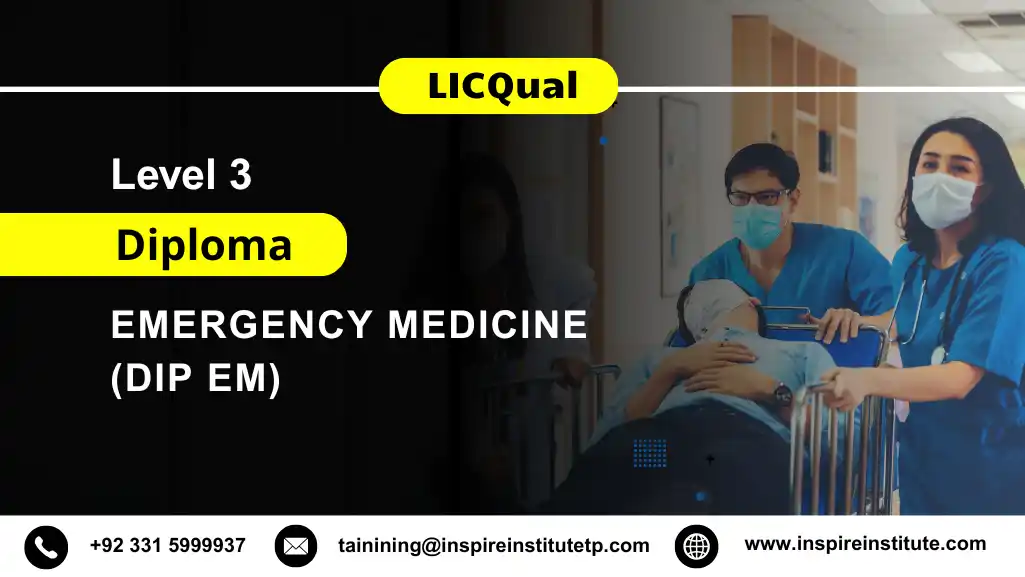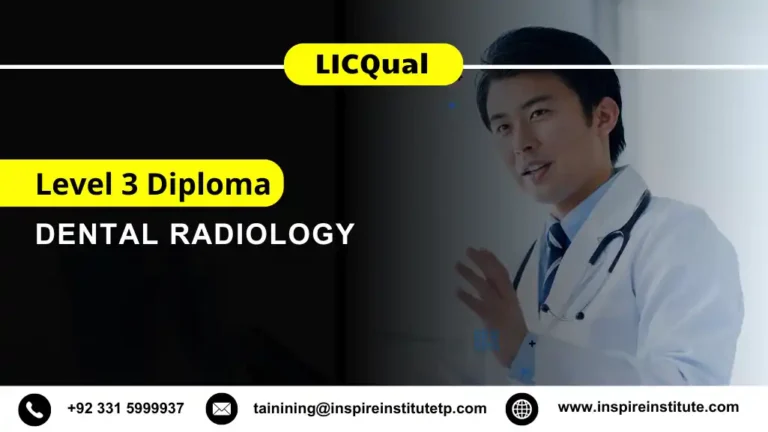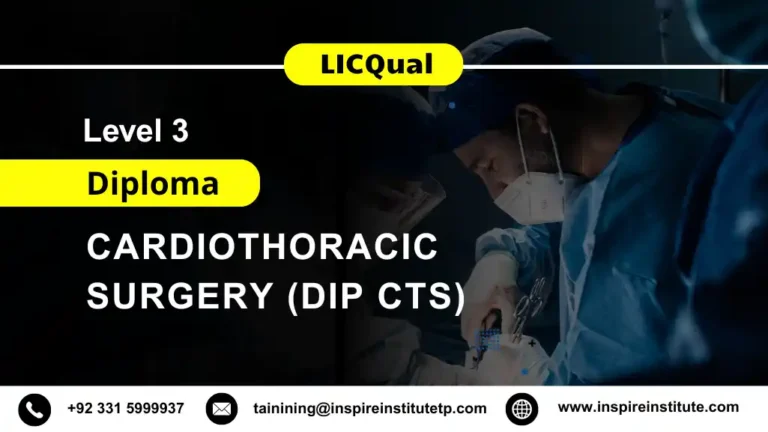LICQual Level 3 Diploma in Emergency Medicine (Dip EM)
The LICQual Level 3 Diploma in Emergency Medicine (Dip EM) is a UK-accredited qualification designed for healthcare professionals seeking to advance their expertise in emergency care, trauma management, and critical patient support. With medical emergencies on the rise globally, the demand for skilled emergency medicine practitioners continues to grow. This diploma equips learners with the essential knowledge and practical skills required to respond effectively to life-threatening conditions, ensuring timely and accurate patient care in critical situations.
This assignment-based programme combines advanced theoretical learning with real-world applications, making it ideal for professionals balancing clinical responsibilities with further education. The LICQual Level 3 Diploma in Emergency Medicine focuses on urgent care practices, triage procedures, and acute response strategies that prepare learners to handle complex medical emergencies confidently. By integrating evidence-based protocols with hands-on approaches, this course develops practitioners who can deliver safe and efficient care in high-pressure environments.
One of the core strengths of this diploma is its comprehensive coverage of emergency medicine principles. Learners gain specialist knowledge in trauma assessment, resuscitation techniques, cardiac and respiratory emergencies, shock management, and neurological crises. The curriculum also emphasizes ethical medical practice, patient safety, and multidisciplinary collaboration, ensuring graduates are prepared to work effectively within emergency departments, critical care units, and pre-hospital care settings.
Practical application forms the foundation of the Dip EM qualification, enabling learners to apply their skills in real-world scenarios. Students develop competence in stabilizing critically ill patients, managing acute injuries, supporting diagnostic decision-making, and implementing advanced life support measures. This ensures they are not only academically prepared but also professionally capable of making swift and accurate interventions during emergencies.
Flexibility is another key advantage of the LICQual Level 3 Diploma in Emergency Medicine (Dip EM). Delivered through an assignment-based pathway, the programme allows healthcare professionals to progress at their own pace while continuing to meet their clinical obligations. This structure supports learners worldwide who are seeking academic progression without disrupting their current roles in hospitals, clinics, or community healthcare.
Graduates of this diploma gain a UK-recognised qualification in emergency medicine that enhances professional credibility and opens diverse career opportunities. From working in emergency departments and trauma centers to contributing to pre-hospital emergency care and medical education, learners are empowered to build impactful careers. By combining knowledge, skills, and internationally aligned accreditation, the LICQual Level 3 Diploma in Emergency Medicine (Dip EM) stands as a vital stepping stone for professionals committed to advancing in the fast-paced field of emergency medicine.
Why Choose this Qualification
The LICQual Level 3 Diploma in Emergency Medicine (Dip EM) is a UK-accredited qualification designed for healthcare professionals seeking to advance their knowledge and practical skills in emergency care, trauma management, and acute patient support. This course combines advanced theoretical learning with practical applications, enabling learners to handle critical medical situations, apply life-saving interventions, and deliver patient-centered care in high-pressure environments. Designed as an assignment-based programme, it provides flexibility for professionals balancing clinical responsibilities with further education.
Key Reasons to Choose this Qualification:
Specialist Knowledge: Gain a comprehensive understanding of emergency medicine, including trauma assessment, cardiac and respiratory emergencies, neurological crises, and shock management. Learn evidence-based approaches to triage, resuscitation, acute care interventions, and patient stabilization. This knowledge equips professionals to provide safe, timely, and effective care in urgent and critical medical situations.
Practical Application: Develop competence in managing emergency cases, performing rapid assessments, applying life support techniques, and stabilizing critically ill patients. Learners also gain skills in crisis management, multidisciplinary collaboration, and patient counseling during emergencies, ensuring readiness for real-world clinical and community healthcare settings.
UK-Accredited Diploma: Earn a UK-recognised qualification that validates expertise in emergency medicine and enhances professional credibility. Accreditation ensures alignment with international healthcare standards, making this diploma valuable for doctors, nurses, paramedics, emergency responders, and allied health professionals.
Flexible Learning Pathway: Benefit from an assignment-based structure that allows learners to progress at their own pace while continuing to work in hospitals, emergency departments, and urgent care settings. This flexible format supports busy healthcare professionals seeking academic and career advancement without interrupting patient care.
Evidence-Based Training: Explore current research, clinical protocols, and best practices in emergency care. The programme emphasises safe and effective interventions, ethical practice, rapid decision-making, and patient-centered strategies that improve outcomes for individuals experiencing medical emergencies.
Career Development: Expand career opportunities in hospitals, trauma centers, pre-hospital emergency care, urgent care units, and healthcare education. The LICQual Level 3 Diploma in Emergency Medicine equips learners with the expertise to contribute to improved emergency response systems, patient safety, and professional growth within the healthcare sector.
The LICQual Level 3 Diploma in Emergency Medicine (Dip EM) empowers healthcare professionals with the knowledge, skills, and UK-accredited recognition necessary to deliver high-quality, evidence-based emergency care. It is an essential qualification for those looking to advance their careers while improving patient outcomes in the fast-paced and vital field of emergency medicine.
Course Overview
LICQual UK Awarding Body
Average Completion Time:
4-12 Months
Study Units: 6 Units
Evidence & Assignment Based
Mandatory Units
Who Should Take This Course
The LICQual Level 3 Diploma in Emergency Medicine (Dip EM) is a UK-accredited qualification designed for healthcare professionals who wish to develop advanced knowledge and practical skills in emergency care and acute patient management. This course is ideal for practitioners aiming to improve patient outcomes, apply life-saving interventions, and progress within the specialised field of emergency and trauma medicine. It equips learners with in-depth theoretical insights and practical approaches to emergency assessment, diagnosis, treatment strategies, and patient-centered care, supporting both professional growth and improved quality of care in hospital, community, and pre-hospital settings.
This course is suitable for:
Nurses and Healthcare Assistants: Professionals seeking to enhance their expertise in emergency response, triage, and acute patient management, enabling them to deliver rapid, safe, and effective care.
General Practitioners and Physicians: Clinicians wishing to strengthen their skills in emergency diagnosis, critical care interventions, and multidisciplinary management to optimise outcomes in urgent and life-threatening conditions.
Aspiring Specialists: Healthcare professionals preparing for higher-level qualifications or specialist pathways in emergency medicine, trauma care, or acute care who want to establish a strong academic and clinical foundation.
Paramedics and Emergency Responders: Practitioners aiming to develop competencies in pre-hospital emergency management, trauma response, and patient stabilisation in high-pressure environments.
Healthcare Educators and Trainers: Professionals interested in advancing their knowledge of emergency medicine to support teaching, training, and research within urgent and critical care education.
Healthcare-Oriented Learners: Individuals with a professional interest in emergency care who wish to understand the principles, treatment protocols, and impact of emergency medicine on patient survival and recovery.
The LICQual Level 3 Diploma in Emergency Medicine (Dip EM) is particularly valuable for healthcare professionals seeking to specialise in acute care, strengthen their clinical expertise, and achieve a UK-accredited qualification. By combining evidence-based learning with practical application, this diploma supports career progression, professional recognition, and the ability to meet the growing demand for skilled emergency medicine practitioners in modern healthcare.
Course Benefits
The LICQual Level 3 Diploma in Emergency Medicine (Dip EM) provides significant benefits for healthcare professionals seeking to enhance their expertise in acute care, emergency response, and critical patient management. By combining advanced theoretical knowledge with practical application, this diploma equips learners to deliver life-saving interventions, implement effective treatment strategies, and improve patient outcomes in urgent and high-pressure situations. Designed as a flexible, assignment-based programme, it fosters professional development while maintaining clinical and academic excellence in modern emergency medical practice.
Key Benefits of the Course:
- Specialist Knowledge: Gain a comprehensive understanding of emergency medicine, including trauma care, acute illnesses, cardiac emergencies, and critical patient assessment. Learners study evidence-based protocols for triage, resuscitation, rapid diagnostics, and emergency treatment approaches to ensure safe and effective patient management.
- Practical Application: Develop competence in performing emergency assessments, applying life-saving interventions, managing trauma and shock, and supporting patients in pre-hospital and hospital emergency settings. Learners also acquire skills in crisis response, airway management, and interdisciplinary collaboration to ensure efficient and effective care delivery.
- Recognised Qualification: Earn a UK-accredited diploma that validates advanced expertise in emergency medicine and opens professional opportunities in hospitals, trauma centres, pre-hospital care services, and educational institutions. Accreditation ensures alignment with global healthcare standards and recognised emergency care practices.
- Flexible Learning Pathway: Benefit from an assignment-based study structure that allows learners to advance academically while continuing professional responsibilities. This flexible format is ideal for busy healthcare practitioners balancing demanding emergency shifts with further education.
- Evidence-Based Training: Explore the latest research, clinical guidelines, and protocols in emergency medicine, ensuring safe, effective, and evidence-driven practice. Learners are trained to adopt modern emergency care approaches while prioritising patient safety, speed, and precision.
- Career Development: Expand career pathways as an emergency care practitioner, trauma specialist, or acute care provider, with opportunities to move towards leadership roles in hospitals, ambulance services, and healthcare education. This qualification strengthens employability in both clinical and academic environments.
- Enhanced Patient Care: Contribute to improved patient outcomes by providing accurate emergency assessments, rapid interventions, and patient-centered critical care. The ability to manage time-sensitive and life-threatening conditions enhances survival rates and quality of life.
- Professional Growth: Strengthen clinical skills, rapid decision-making, and interdisciplinary collaboration under pressure. This diploma prepares healthcare professionals to play a vital role in emergency medicine, improving care quality, patient safety, and emergency response systems.
The LICQual Level 3 Diploma in Emergency Medicine (Dip EM) equips learners with advanced knowledge, practical skills, and a UK-recognised qualification. It empowers healthcare professionals to expand their expertise, deliver life-saving care, and pursue career progression while meeting the growing demand for skilled emergency medicine specialists.
Eligibility Criteria
The LICQual Level 3 Diploma in Emergency Medicine (Dip EM) is a UK-accredited programme designed for healthcare professionals who wish to enhance their expertise in acute care, trauma management, and emergency response. This assignment-based qualification combines advanced theoretical knowledge with practical application, making it ideal for nurses, general practitioners, paramedics, and healthcare educators aiming to develop specialist skills in emergency medicine. By meeting the entry requirements, learners ensure they are fully prepared to succeed in the programme and apply their knowledge confidently in clinical and pre-hospital emergency settings.
Educational Background:
Applicants must hold a recognised healthcare qualification such as a nursing degree, diploma in healthcare practice, paramedic qualification, medical degree, or an equivalent certification. Those with Level 2 or Level 3 qualifications in healthcare, emergency care, or related fields may also be considered. Equivalent international qualifications will be reviewed on a case-by-case basis to ensure suitability for the programme.
Professional Experience:
A minimum of one year of clinical, emergency care, or pre-hospital healthcare experience is recommended. Prior exposure to trauma care, accident and emergency (A&E) services, or critical care is advantageous, though motivated healthcare professionals without direct emergency medicine experience may also apply.
Age Requirement:
Learners must be at least 18 years of age at the time of enrolment, ensuring they possess the professional maturity, responsibility, and clinical judgment required for advanced training in emergency medical practice.
Language Proficiency:
Since the programme is delivered in English, learners should demonstrate proficiency in reading, writing, and communication. A minimum IELTS score of 6.0 or an equivalent qualification is recommended for non-native English speakers to ensure they can complete assignments and fully engage with course materials.
Technical Requirements:
Applicants should have access to a computer or laptop with a stable internet connection, as well as basic IT skills to manage digital resources, conduct research, and submit assignments through online platforms.
Required Documents:
Submission of a valid ID or passport, proof of educational qualifications, and evidence of professional experience (if applicable) is necessary for registration. Additional documentation may be required for applicants presenting international qualifications.
The Qualification Process
LICQual Level 3 Diploma in Emergency Medicine (Dip EM) follows a structured pathway to ensure learners gain comprehensive knowledge, practical skills, and professional competence in community oral healthcare.
Step 1: Self-Assessment
Learners review the entry requirements to confirm eligibility. Candidates with a background in dentistry, oral health, or public health are encouraged to apply.
Step 2: Registration
Complete the registration process by submitting required documents such as proof of qualifications, a valid ID, and payment of enrollment fees.
Step 3: Induction
An induction session is conducted to:
- Verify learner eligibility and documentation.
- Introduce study materials, learning outcomes, and assessment procedures.
Step 4: Learning and Evidence Submission
Learners complete assignments, case studies, and practical exercises demonstrating competence in public health dentistry, community oral health assessment, preventive strategies, and program planning.
Step 5: Feedback and Revision
Assessors review submitted evidence and provide constructive feedback. Learners can revise and resubmit work to meet all required standards.
Step 6: Competence Validation
Final submissions are evaluated to confirm that learners have met all theoretical and practical learning outcomes.
Step 7: Internal Quality Assurance (IQA)
The IQA team reviews the assessment process to ensure accuracy, fairness, and compliance with international standards.
Step 8: External Verification (EQA)
External verifiers validate the authenticity and quality of learner achievements.
Step 9: Certification
Upon successful verification, learners are awarded LICQual Level 3 Diploma in Emergency Medicine (Dip EM), demonstrating advanced proficiency in community oral healthcare and preparing them for professional growth in dental public health, preventive dentistry, and healthcare policy.







